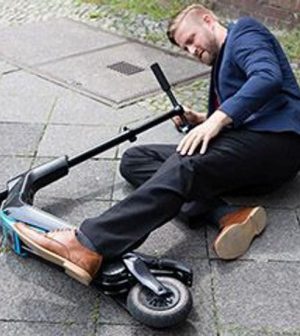- Recognizing the Signs of Hypothyroidism
- 10 Strategies to Overcome Insomnia
- Could Artificial Sweeteners Be Aging the Brain Faster?
- Techniques for Soothing Your Nervous System
- Does the Water in Your House Smell Funny? Here’s Why
- Can a Daily Dose of Apple Cider Vinegar Actually Aid Weight Loss?
- 6 Health Beverages That Can Actually Spike Your Blood Sugar
- Treatment Options for Social Anxiety Disorder
- Understanding the Connection Between Anxiety and Depression
- How Daily Prunes Can Influence Cholesterol and Inflammation
More E-Scooter Rideshares, More Injuries

As the use of e-scooters has risen with the introduction of urban rideshare programs, so have serious injuries associated with their use, a new study finds.
Neck and head injuries are especially common.
“Since e-scooters became a popular form of transportation in major cities, the number of injuries jumped significantly because they’ve become more available to more people,” said study co-author Dr. Kathleen Yaremchuk. She’s chair of otolaryngology – head and neck surgery with the Henry Ford Health System, in Detroit.
App-based e-scooter rideshare systems began appearing in cities across the United States in late 2017. The scooters can travel up to 35 miles an hour and they’re cheap to rent and use. But injuries have increased as more people use them, mostly in crowded city centers and on college campuses, according to the study authors.
Analyzing U.S. Consumer Product Safety Commission data, the researchers found that more than 100,000 e-scooter-related injuries were reported between January 2009 and December 2019.
Head and neck injuries accounted for nearly 28% of those injuries, according to the report published online recently in The Laryngoscope journal.
“We hope our findings will help educate users of rideshare e-scooters about the potential for serious head and neck injuries and the safety precautions they should take,” Yaremchuk said in a health system news release.
Study co-author Dr. Samantha Tam, a Henry Ford otolaryngologist, said, “As a physician, I would recommend that people who use this mode of transportation wear a helmet and apply the same approach as when driving a car.”
If you use an electric scooter, you need to be aware of potential hazards that could put you at risk, the study authors stressed.
Research has shown that e-scooter crashes involve cars as well as ground obstacles, such as curbs, poles and manhole covers. Other factors associated with e-scooter crashes include mechanical problems (such as failing brakes and wheels), and distracted riders.
More information
The U.S. National Library of Medicine has more on head injuries.
SOURCE: Henry Ford Health System, news release, June 17, 2021
Source: HealthDay
Copyright © 2026 HealthDay. All rights reserved.










